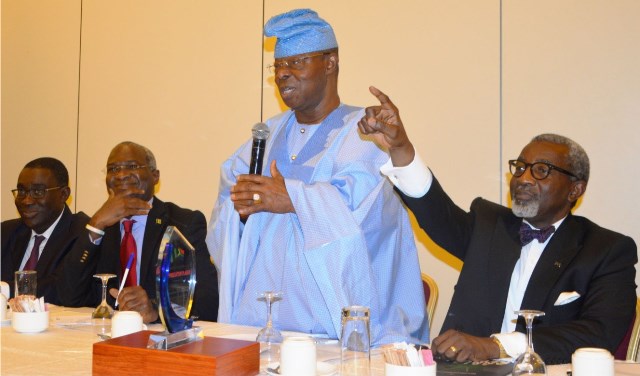Business
FG Targets 30% In Renewable Energy By 2030

In a bid to diversify its energy sources and optimise other assets for power production, Nigeria is targeting 30 per cent of its energy needs from renewables by 2030.
The Minister of Works, Power and Housing, Mr Babatunde Fashola made the assertion in a keynote address at the 2018 pre-conference workshop of the Nigerian Association of Petroleum Explorationists (NAPE) in Lagos last Monday.
Fashola said that the current component of grid power consists mainly of gas-fired power (85%) and hydropower (15%), adding that there was the need to produce an energy mix that targets a 30 per cent component of renewable energy out of the gross energy produced by 2030.
“Let me be clear and unequivocal by saying upfront that our commitment as a nation and government to pursue renewable and low carbon energy at low cost is clear, firm and unshaking.
“But this is not all. It is a commitment driven by necessity, contract and policy,” he said.
The minister said that government had also matched its intent with actions such as signing 14 solar power purchase agreement (PPAs) with 14 developers with the potential to deliver over 1,000 MW of solar power.
“In addition to the necessity to diversify our energy sources from gas and provide some energy security, we are also driven to pursue renewable energy by contract,” he said.
He said that Africa must intensify efforts at improving transmission grid for renewable energy to be effectively developed on the continent.
Fashola said that Nigeria as a committed member of the United Nations, African Union and ECOWAS, has adopted several international treaties and policies which promote the use of renewable energy.
This, he said, was in line with the national vision to provide incremental power, and then steady and uninterrupted power.
The minister said that the Federal Government recently approved an integrated energy mix targets under Electricity Vision 30:30:30 which targets generation of 30 GW in 2030, with 30 per cent from renewable energy sources.
“Africa has trillions of standard cubic feet of natural gas reserves, billions of barrels of crude oil reserves and billions of tonnes of coal,” he said.
The minister said that government had completed arrangements to concession six hydro dams to private operators under build, operate and transfer (BOT) scheme.
He said the step was aimed at energising educational institutions and markets in the country.
Fashola said: “These are government-led initiatives based on the rural electrification plan approved by the president in 2016 to provide access to power for rural dwellers and vulnerable members of our society.
“We proposed to use six small hydro-dams that had been abandoned for decades, Federal Government owned universities and some markets as anchors.
“Apart from the universities, where government is directly funding the intervention, the markets are being privately funded”.
Transport
Automated Points Concession : FAAN Workers Gave 72hrs To Revise Decisions In PH

Transport
FAAN Announces Pick-Up Points for Go-Cashless Cards

Business
Fidelity Bank To Empower Women With Sustainable Entrepreneurship Skills, HAP2.0
-

 News4 days ago
News4 days agoAmend Constitution To Accommodate State Police, Tinubu Tells Senators
-

 Politics4 days ago
Politics4 days agoSenate Urges Tinubu To Sack CAC Boss
-
Business4 days ago
Crisis Response: EU-project Delivers New Vet. Clinic To Katsina Govt.
-
Business4 days ago
President Tinubu Approves Extension Ban On Raw Shea Nut Export
-

 News4 days ago
News4 days agoDisu Takes Over As New IGP …Declares Total War On Corruption, Impunity
-
Business4 days ago
Fidelity Bank To Empower Women With Sustainable Entrepreneurship Skills, HAP2.0
-
Business4 days ago
President Tinubu Extends Raw Shea Nuts Export Ban To 2027
-
Sports4 days ago
NDG: Rivers Coach Appeal To NDDC In Talent Discovery

